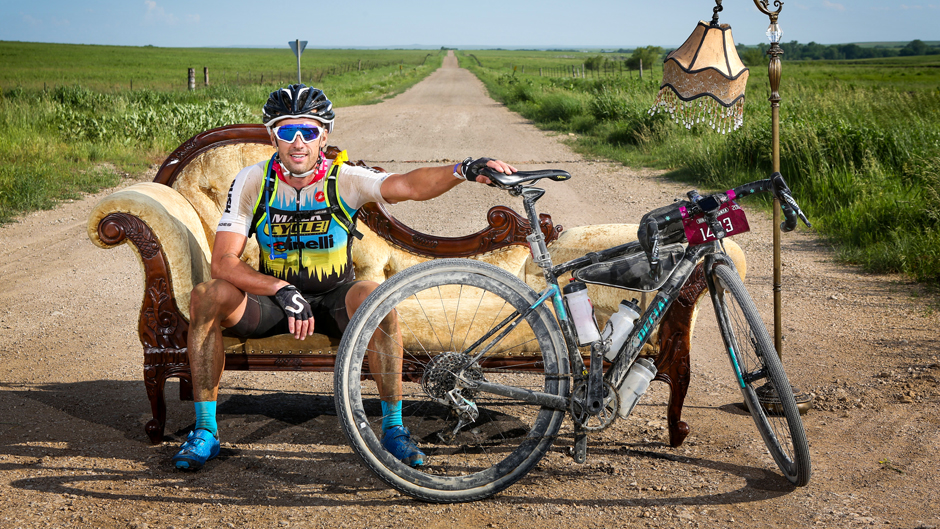As an organic chemist who designs molecules to exhibit traits needed by other researchers, James Wilson relies on team science to shape his work.
For example, in a recent National Institutes of Health-funded study, Wilson collaborated with a researcher at Sylvester Comprehensive Cancer Center, part of the University of Miami Miller School of Medicine, to develop molecules that can illuminate cancer-signaling pathways used for staging cancer and to assess drug efficacy.
Outside of the classroom and lab, Wilson is a solo warrior who pushes his body to the limits as a competitive cyclist. He recently completed the infamous GAPCO (Great Allegheny Passage and Chesapeake and Ohio Canal), a 335-mile gravel ride from Pittsburgh to Washington, D.C., in 19 hours and 39 minutes—one of the fastest times ever recorded. He did it by himself, without sleeping and without support.
A track athlete in high school, Wilson began cycling as an undergraduate at the University of South Carolina. He competed in local and national events, then tapered his riding while completing his Ph.D. at the Georgia Institute of Technology.
Wilson came to the University of Miami in 2008 and is now associate professor of chemistry in the College of Arts and Sciences and director of PRISM, a program that provides selected undergraduates with a strong foundation in science, math, and research skills. His lab also markets two commercially successful stains for DNA and cells in colors he unabashedly named “Miami orange” and “Miami green.”
And though Wilson wasn’t cycling much when he arrived in Miami, he was happy to notice throngs of cyclists on the streets of his new town.
“By then I had two kids, I had been through tenure, and at about 35 years old, age caught up to me,” Wilson reflected. “My blood pressure was going up, I had trouble sleeping at night, and other little sources of inflammation would pop up.”
So, Wilson vowed to start racing again when he turned 40.
“I needed the focus,” he explained. “Racing my bike was a prescription for a holistic health intervention.”
Today, Wilson competes in road and gravel cycling events around the world. In October 2022 he represented the United States in the Union Cycliste Internationale Gravel Worlds competition in Italy, along with University of Miami alumna Rachel Losada, co-owner of Mack Cycle and Fitness. Wilson earned a spot in the 103-mile race after finishing sixth out of 95 men in his age group in an Arkansas qualifier.
Wilson earns his fair share of podium victories but prefers to ride in the harder, open-category events than to keep winning master’s events, where he can compete only with cyclists in his age group.
“I get more of a sense of accomplishment from doing a really hard race—and for a brief second rubbing shoulders with a pro, and they can totally dust me by the end—just to say I was there,” Wilson said.
Wilson admits that the GAPCO ride was “probably the stupidest thing I have ever done.” But in the process, he discovered his capacity to overcome adversity. After doing some research and mapping possible locations for water fountains and gas stations, Wilson started the ride at 2 a.m. to reach the most treacherous sections during daylight hours. A downed tree branch prompted a nasty fall at mile 100, but with no cell phone service and no one around, he cleaned his wounds and kept going. After 16 hours, he felt “leg-locking pain” and had to coax his legs into slowly increasing their speed.
Through it all, his motivation stayed strong. He thought about the impact of cycling on his health and about an article he read on physical fitness as a predictor of COVID-19 survivability.
“The article said that exercise is the only intervention that has a beneficial correlation across all diseases,” he said. “That is probably the single most powerful sentence—and something everybody should read.”
Other times, he reflected on a family member recently diagnosed with cancer whose treatment regimen is a much harder journey than the miles under his wheel.
“I can go and do something like this, and I could climb off my bike and call an Uber and drive to D.C. But what I am going through is nothing compared to what somebody on chemo deals with,” Wilson said. “If they decide to quit, they die. It was truly perspective changing.”

